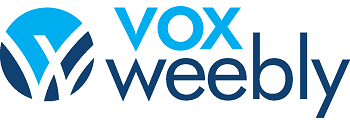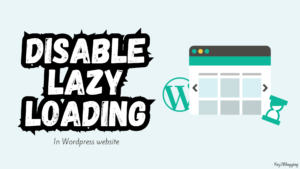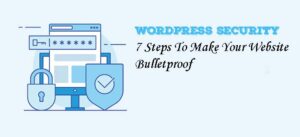WordPress is a popular platform for building websites and blogs. However, with its popularity comes a risk of security threats. That’s why it’s important to take steps to secure your WordPress website. In this article, we’ll discuss seven steps you can take to ensure the security of your WordPress site.
We all know that security is the most important part of any website. As we are talking about website security, so we should always be aware that the internet is a dangerous place and our websites are compromised all the time.
We know that nothing is secure in the online world, but sometimes due to a lack of knowledge and skill as a developer and owner of the website gives the opportunity to hackers to hack your website.
So, if especially talk about the WordPress platform, then the first question on mind clients probably wonder before development is, is WordPress secure? … For the most part, YES. However, WordPress usually gets a bad reputation for being prone to security vulnerabilities and is considered not a safe platform to use for a business.
So, if you are trying to hire a our developer then make sure you take their interview and make sure he has enough knowledge for the security level.
Hacking is performed by automated scripts on a regular basis written to scour the internet in an attempt to exploit known website security issues in software. Below are a few ways to keep your WordPress site safe online.
1. Change Default WordPress Prefix Database Name
When installing a WordPress website most of the time database prefix name is wp_. So please change the default prefix name and make a name unique.
2. Check Your Username & Password
Everyone knows that they need to use a strong password, but they never practice doing so. As much as users do not like it, enforcing password requirements such as a minimum of around eight characters, including an uppercase letter and number will help to protect their information in the long run. Also Most of the time username admin so please name unique to secure your website.
3. Change admin login URL
As mentioned in the above two-point same as the developer doesn’t change the admin login URL on the website. you can change the admin URL name easily using a plugin like Change wp-admin login.
4. Keep up to Date WordPress version, theme & plugin
Either it’s server operating system software or software that you run in your CMS or forum, you should always keep the updates at a regular interval of time. If your website is hosted on a managed hosting solution then you don’t need to worry about it as they do these things on their ends.
But, if you are using any third-party software or any CMS like WordPress, then make sure to apply the patches or update with a new version whenever it is asked.
You can set WordPress to automatically install all plugin updates by simply adding this code to your theme’s functions.php file
add_filter( 'auto_update_plugin', '__return_true' );
This filter tells WordPress automatic updates to install plugin updates when they’re available.
If you also want to automatically update your themes, then you can add another code like this on your function.php file:
add_filter( 'auto_update_theme', '__return_true' );
5. Limit Login Attempts
By default, WordPress allows unlimited login attempts. This makes it easier for hackers to guess your login credentials through brute-force attacks. To avoid this, limit login attempts by using plugins like Limit Login Attempts Reloaded or Login Lockdown.
6. Secure Your Hosting
Make sure your hosting provider offers secure hosting. This includes features like SSL/TLS certificates, backups, and firewalls. Choose a hosting provider that takes security seriously.
7. Install Security Plugins & Use Two-Factor Authentication
Always use the security plugin for the website that protects the website using FIREWALL and protects it from other hacking or phishing. There are lots of plugins available some of the below plugins use to secure websites:
Two-factor authentication adds an extra layer of security to your WordPress site. It requires you to enter a code in addition to your password to log in. You can use plugins like Google Authenticator, Duo Two-Factor Authentication, or Yubikey to set up two-factor authentication.
By following these seven steps, you can secure your WordPress website and protect it from security threats. Remember, security is an ongoing process. Stay vigilant and regularly check for security updates and new threats.
Conclusion
Securing your WordPress website is essential to protect it from cyber attacks and data breaches. By following the 7 steps outlined in this guide, you can significantly reduce the risk of your site being compromised. From choosing strong passwords and keeping your software updated to implementing security plugins and backups, these simple yet effective measures can go a long way in ensuring the safety of your website and data. By taking the time to secure your WordPress site, you can focus on growing your business and engaging with your audience with peace of mind.
At Vox Weebly, we are dedicated to helping website owners achieve their online goals with practical tips and advice. Follow us for more useful insights on website design, development, and digital marketing.



